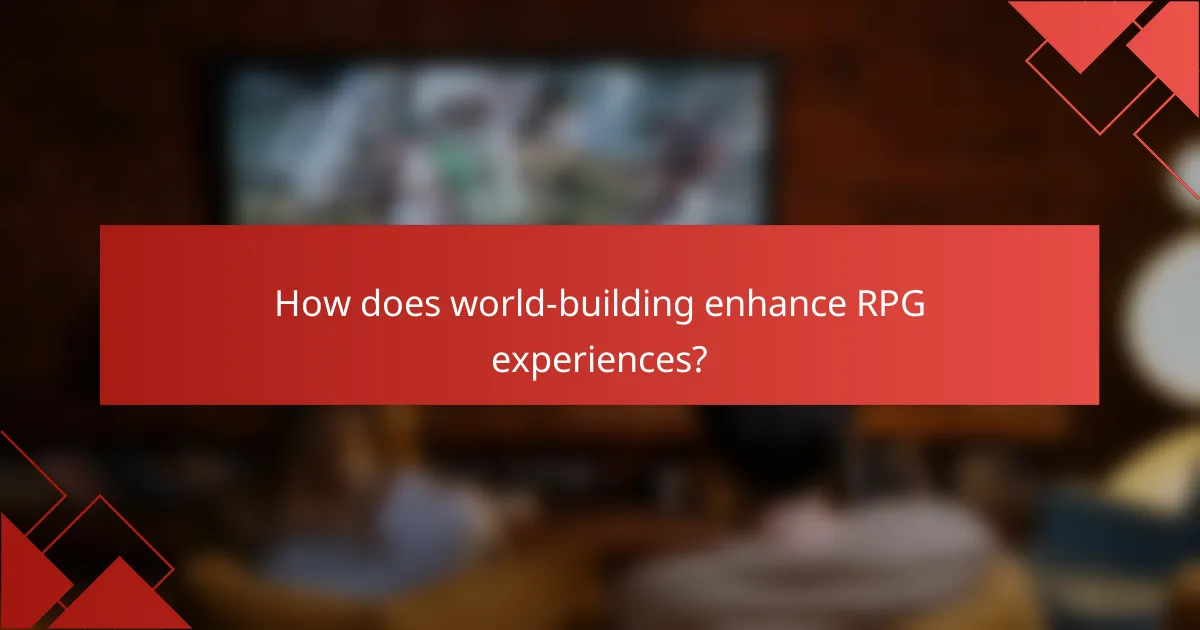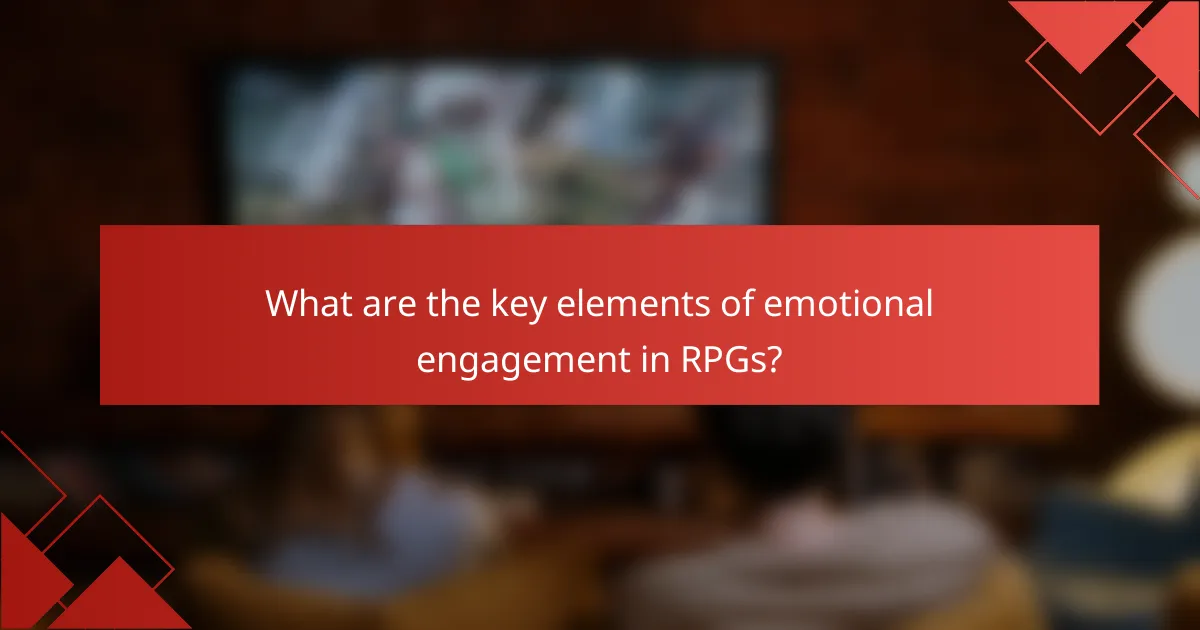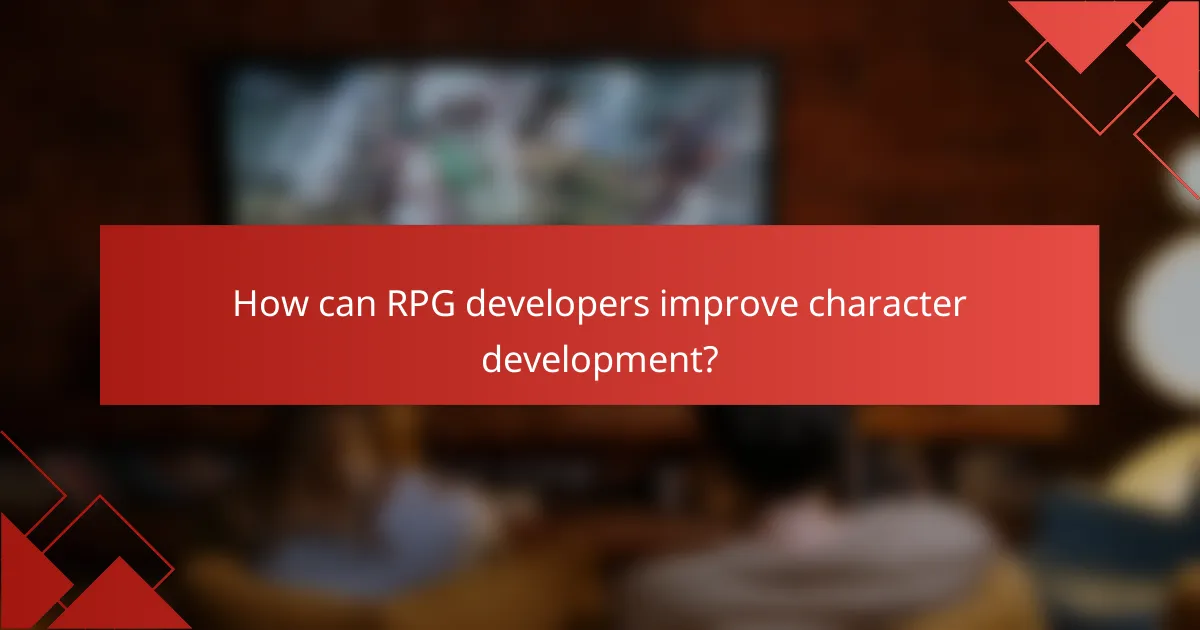RPG games excel at fostering emotional investment by immersing players in intricate narratives, relatable characters, and impactful choices. Through effective character arcs that showcase growth and transformation, players develop a deeper connection to the story and its inhabitants. Additionally, robust world-building creates captivating environments that enhance both character development and overall gameplay, making each adventure unforgettable.

How do RPG games create emotional investment?
RPG games foster emotional investment by immersing players in rich narratives, relatable characters, and meaningful choices. These elements work together to create a deep connection between the player and the game world, enhancing the overall experience.
Character-driven narratives
Character-driven narratives focus on the development of complex characters with distinct personalities, backgrounds, and motivations. Players often form attachments to these characters as they evolve throughout the game, facing challenges and overcoming obstacles.
For instance, a character’s backstory may reveal personal struggles or aspirations that resonate with players, making their journey more impactful. This emotional connection can lead to a greater investment in the character’s fate and decisions.
Player choices and consequences
Player choices significantly influence the narrative and character arcs, creating a sense of agency and ownership over the story. When players make decisions that affect the outcome of the game, they become more emotionally invested in the consequences of those choices.
For example, choosing to save a character or sacrifice them for the greater good can lead to different story paths and endings, enhancing the emotional weight of each decision. This dynamic encourages players to reflect on their values and the impact of their actions.
Immersive storytelling techniques
Immersive storytelling techniques, such as detailed world-building, engaging dialogue, and atmospheric sound design, enhance the emotional investment in RPGs. A well-crafted world invites players to explore and discover its lore, making them feel like active participants in the story.
Techniques like branching dialogue options and cutscenes can deepen the player’s connection to the narrative. For instance, a heartfelt conversation with a companion can evoke strong emotions, reinforcing the player’s attachment to the characters and their journeys.

What are effective character arcs in RPGs?
Effective character arcs in RPGs involve a journey of growth and change, driven by challenges and experiences. These arcs typically showcase how characters evolve through their interactions and conflicts within the game world, enhancing player emotional investment.
Transformation through conflict
Transformation through conflict is central to character development in RPGs. Characters often face obstacles that test their beliefs, skills, and relationships, leading to significant personal growth. For example, a once selfish hero might learn the value of teamwork after facing a formidable enemy alongside allies.
To create impactful transformations, consider the nature of the conflicts. They should be meaningful and resonate with the character’s goals and values. Avoid trivial challenges; instead, present dilemmas that force characters to make tough choices, shaping their identity and motivations.
Relatable backstories
Relatable backstories provide depth to characters, making their journeys more engaging. Players connect with characters who have experiences that mirror their own struggles or aspirations. A character with a tragic past, such as losing a loved one, can evoke empathy and drive players to invest emotionally in their growth.
When crafting backstories, ensure they are relevant to the game’s themes and plot. Use elements like personal loss, ambition, or moral dilemmas to create a foundation for character development. This connection can enhance player immersion and attachment to the character’s arc.
Dynamic relationships with NPCs
Dynamic relationships with non-player characters (NPCs) significantly influence character arcs in RPGs. These interactions can lead to alliances, rivalries, or mentorships, all of which contribute to a character’s growth. For instance, a character might start as a lone wolf but gradually form bonds that challenge their independence.
To foster meaningful relationships, design NPCs with distinct personalities and motivations. Allow players to make choices that affect these relationships, such as supporting or betraying NPCs. This interactivity not only enriches the narrative but also reinforces the character’s development through social dynamics.

How does world-building enhance RPG experiences?
World-building is crucial in RPGs as it creates immersive environments that draw players into the narrative. A well-constructed world enriches character arcs and emotional investment, making the gameplay experience more engaging and memorable.
Detailed lore and history
Detailed lore and history provide depth to the game world, allowing players to understand the context of their characters’ actions. This background can include ancient civilizations, significant events, and legendary figures that shape the current landscape. For instance, a game might feature a war that occurred centuries ago, influencing the political dynamics players encounter.
Players often appreciate discovering hidden lore through exploration or quests, which can lead to a greater emotional connection with the world. Incorporating items, books, or NPCs that reveal snippets of history can enhance this experience.
Interactive environments
Interactive environments allow players to engage with the world in meaningful ways, enhancing immersion. This can include destructible objects, dynamic weather systems, or NPCs that react to player choices. For example, a player might influence a town’s economy by completing quests that affect local trade.
Designing environments that respond to player actions encourages exploration and experimentation. Consider implementing puzzles or challenges that require players to interact with their surroundings, fostering a sense of agency and investment in the world.
Cultural diversity within game worlds
Cultural diversity enriches RPG worlds by introducing varied customs, languages, and belief systems. This diversity can manifest in different factions, each with unique motivations and histories, providing players with a richer narrative experience. For example, a game might feature a desert tribe with distinct rituals alongside a technologically advanced city-state.
Incorporating diverse cultures can also enhance character development, as players navigate complex social dynamics. Ensure that cultural representations are respectful and well-researched to avoid stereotypes and foster genuine engagement with the game world.

What are the key elements of emotional engagement in RPGs?
Key elements of emotional engagement in RPGs include player agency, the consequences of actions, and the emotional resonance of character fates. These factors create a deep connection between players and the game, enhancing the overall experience.
Player agency and involvement
Player agency refers to the ability of players to make meaningful choices that affect the game world and narrative. When players feel that their decisions shape the story, they become more invested in the outcomes. This involvement can be achieved through branching storylines, customizable characters, and interactive environments.
To enhance player agency, developers should offer multiple paths and outcomes based on player choices. For example, allowing players to choose between different factions or moral alignments can lead to diverse gameplay experiences. This not only increases replayability but also strengthens emotional ties to the characters and story.
Consequences of player actions
The consequences of player actions are crucial for fostering emotional engagement in RPGs. When players see that their choices lead to tangible results, they feel a greater sense of responsibility and connection to the game. This can manifest in various ways, such as changes in the game world, character relationships, or story progression.
Developers should ensure that consequences are clear and impactful. For instance, if a player decides to betray a character, that character’s fate should visibly change, affecting future interactions and storylines. This creates a more immersive experience, as players recognize the weight of their decisions.
Emotional resonance of character fates
The emotional resonance of character fates plays a significant role in engaging players on a deeper level. When players form attachments to characters, their outcomes—whether positive or negative—can evoke strong feelings. This connection is often built through well-developed backstories and relatable motivations.
To maximize emotional resonance, developers should craft character arcs that reflect growth, struggle, and transformation. For example, a character who overcomes personal challenges or faces tragic losses can leave a lasting impact on players. By allowing players to influence these arcs, the emotional stakes are heightened, leading to a more fulfilling gaming experience.

How can RPG developers improve character development?
RPG developers can enhance character development by focusing on emotional depth, player engagement, and meaningful choices. By integrating player feedback and creating dynamic storylines, developers can craft immersive experiences that resonate with players.
Incorporating player feedback
Incorporating player feedback is crucial for refining character development. Developers should actively seek input through surveys, forums, and playtesting sessions to understand player preferences and emotional responses. This feedback can guide adjustments to character arcs, ensuring they align with player expectations.
For example, if players express a desire for more backstory on a particular character, developers can expand that character’s narrative, adding depth and enhancing emotional investment. Regularly updating characters based on player insights fosters a sense of community and ownership.
Utilizing branching storylines
Branching storylines allow players to make choices that significantly impact character development and the overall narrative. By implementing multiple paths, developers can create a more personalized experience, where players feel their decisions matter. This approach encourages replayability as players explore different outcomes.
For instance, a character might evolve based on whether the player chooses to ally with or oppose them. This not only affects the character’s growth but also influences relationships with other characters, enriching the narrative landscape.
Collaborative storytelling with players
Collaborative storytelling invites players to contribute to character development, making them feel invested in the narrative. Developers can create opportunities for players to shape character backgrounds, motivations, and relationships through in-game choices or community-driven content.
For example, allowing players to submit character backstories or vote on character decisions can lead to a more engaged player base. This collaboration can deepen emotional connections and create a richer, more diverse world that reflects the community’s input.

What frameworks guide effective RPG world-building?
Effective RPG world-building is guided by frameworks that emphasize coherence, depth, and player engagement. These frameworks help create immersive environments where players can invest emotionally in their characters and narratives.
Character Arcs
Character arcs are essential in RPGs as they define the growth and transformation of characters throughout the game. A well-structured arc typically includes a clear beginning, middle, and end, allowing players to experience meaningful change. For example, a character might start as a reluctant hero and evolve into a confident leader, which enhances emotional investment.
To create compelling character arcs, consider the motivations and backstories of each character. Ensure that their challenges and decisions resonate with players, leading to relatable experiences. Avoid static characters; instead, allow them to face conflicts that prompt personal growth.
Emotional Investment
Emotional investment in RPGs is cultivated through relatable characters and engaging narratives. Players are more likely to connect with characters who face dilemmas that mirror real-life challenges, fostering empathy and attachment. This connection can be deepened by incorporating personal stakes, such as family ties or moral choices.
To enhance emotional investment, create scenarios where players must make tough decisions that impact the story and their characters. Use dialogue and interactions that reflect the characters’ emotions, allowing players to feel the weight of their choices. Avoid superficial relationships; instead, build complex dynamics that evolve over time.
World-Building Techniques
Effective world-building techniques include establishing a rich lore, diverse cultures, and a dynamic environment. A well-developed lore provides a historical context that informs current events within the game world, making it feel alive. Incorporate various cultures with unique customs and beliefs to create a vibrant setting.
Consider using maps and visual aids to help players navigate the world and understand its geography. Create a balance between detail and accessibility; too much information can overwhelm players, while too little can leave them disoriented. Encourage exploration by placing hidden lore and secrets throughout the world.
Player Agency
Player agency refers to the ability of players to make meaningful choices that affect the game world and narrative. Providing players with options enhances their investment and engagement, as they feel their decisions have real consequences. Design quests and storylines that allow for multiple outcomes based on player choices.
To foster player agency, avoid linear storylines that restrict player decisions. Instead, create branching paths and alternative endings that reflect the choices made throughout the game. Encourage players to explore different approaches to challenges, reinforcing the idea that their actions shape the world around them.


